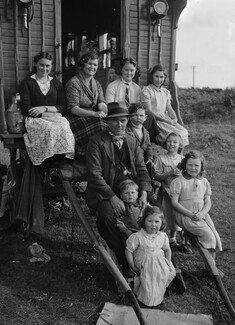The traditions and rituals of Welsh Gypsy women, 1900-2021

Shannon Marie Lock, an academic at Bangor University, north Wales, contacted the Travellers’ Times back in 2020 to ask if we could help share her request for Welsh Gypsy women to get in touch with her for her research into her PhD. Having now completed her PhD, Shannon Marie Lock, a Welsh Romany Gypsy herself, writes about what she found out in her research.
I’ve just completed a PhD which focussed on the traditions and rituals which effected the daily lives of Gypsy women in Wales throughout the twentieth century up to 2021 and I compared the traditions and rituals of Gypsy women in Wales with other Traveller groups across Britain. I also compared the lives of Gypsy women in Wales with the lives of the native Welsh women in the country, to distinguish how different or similar their lives were. There were four main chapters:
- Birth and death
- Marriage and divorce
- Cleanliness rituals and domestic life
- Work and education
I used evidence from autobiographies, newspaper articles from the twentieth century, documents and images from archives and even television programmes. However, the most unique form of evidence I had came from the testimonies from the individuals who contributed to my questionnaire, which Travellers Times were kind enough to publicise whilst I was researching the topic. I’m very grateful to the Travellers Times and those individuals who took the time to fill out the questionnaire. This article will discuss some of the traditions which I discussed in my work, just so you get a sense of what the work was about.
Birth: Danger and baptism
Birth in the Gypsy community could be fraught with danger for the mother and the child traditionally because of the lack of medical support and the lack of basic resources on the traditional Gypsy sites. However, this was true for most working-class families in the twentieth century. The establishment of the NHS helped to improve things, as hospitals were more accessible to pregnant women of every background. By the end of the twentieth century, hospitals seem to be the most popular places for Gypsy women to give birth.
At the start of the twentieth century, there is evidence in Wales that Gypsy newborn babies were being dipped in water from streams and rivers after they had been born. This was more than likely a baptism into a difficult life, lived mostly outdoors. Symbolically it could have been a way to ensure that the child was strong enough to withstand its childhood. Because of the high standards of cleanliness amongst most Gypsy families, cleaning the baby in fresh water after its birth could have made sense too.
Death: Superstition and burning belongings
Traditionally, Gypsies had honoured symbols of death and took these seriously. Sometimes death was forewarned by the individuals who could predict the future. Sometimes signs and symbols in nature, such as certain animals were a way of predicting these things. Wales itself was a superstitious country before the Gypsies arrived and the Welsh themselves continued to be highly superstitious well into the twentieth century. Perhaps this is one of the reasons why the Gypsies who migrated to Wales carried on being superstitious throughout the twentieth century up until the present day.
In Wales, and in fact among other Travelling groups in Britain, such as the Scottish Travellers, it was traditional to burn and destroy the home and possessions of the dead. In a superstitious community, this was a way of ensuring that the spirit or ghost of the dead individual couldn’t come back to earth. As in the case of dipping newborns in fresh water in the birth section, burning the belongings of the dead had an element of symbolism to it as well. Burning the belongings was a symbol that the human life had come to an end and a symbolic way to ensure that the family were protected from spirits who hadn’t passed on.
Marriage: Jumping the Broom
Another tradition that happened among Gypsies in Wales but also among other Travelling groups in Britain was jumping the broom as a marriage ceremony. Young Gypsy couples would jump over a branch of wood, and this would form a marital bond between them. This tradition would encourage the woman’s fertility, an important factor in a community which valued having lots of children. Jumping the broom was sometimes combined with a formal marriage at a church or register office, but sometime the act itself was seen as a formal marriage in the eyes of the Gypsy community. After the ritual took place, celebrations would begin. Gypsies in Wales were noted for being musical, therefore these skills were often used for entertainment.
To Conclude
Until I wrote my thesis, Gypsy women in Wales had been mostly overlooked by academics and the works generally on Gypsies in Wales were sparse. To me it was important to show that Gypsy women have a place in the social history of Wales and that the effect they had on the rural parts of Wales was profound. Finally, it was important to me that the traditions and rituals that effected women were considered properly because this was able to give me an insight on their ways of life, their important roles within their families and communities and the power and respect they inspired.
By Dr Shannon Marie Lock
(Photograph: A Welsh Romany Gypsy/Kale family in 1951, by Geoff Charles, https://commons.wikimedia.org/w/index.php?curid=38725209)
Dr Shannon Marie Lock’s PhD is published in the Welsh language on the Bangor University website.